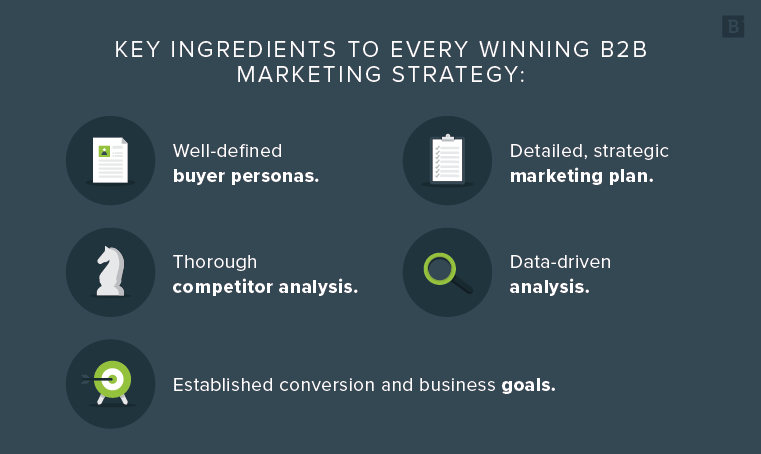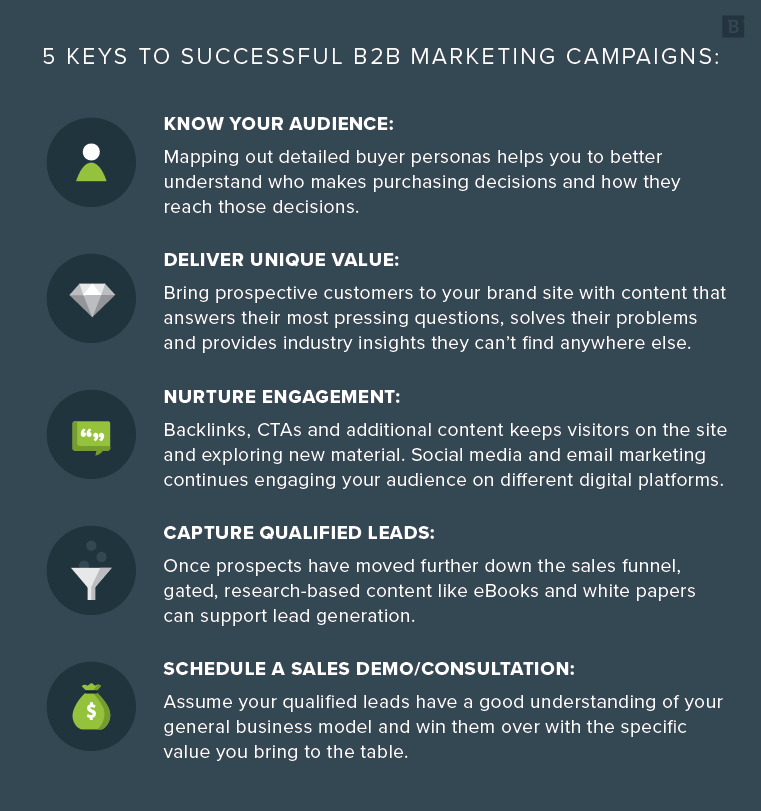Business-to-business marketing has an extensive list of terminology you should be familiar with to fully understand how each piece supports your marketing and business goals.
Let’s clear the air and break down the key B2B marketing terms you need to know.
- What is B2B marketing?
- How important is B2B marketing?
- What are some examples of B2B marketing?
- How do you create a successful B2B marketing strategy?
- How do you approach a B2B sale?
- 5 keys to successful B2B marketing campaigns
- How do you market B2B on social media?
- What are the best B2B marketing tools?
- What B2B marketing services are typically available?
Talk to a Brafton Expert:
By entering your email address, you agree to receive emails from Brafton in accordance with our Privacy Policy.
You may unsubscribe from these communications at any time.
What is B2B marketing?
B2B marketing refers to the techniques and best practices used by companies that sell directly to other businesses. Unlike B2C marketing strategies, which assume the audience is the buyer, B2B marketing has to account for all the different stakeholders who impact business purchases, whether they are executive decision-makers or simply influencers.
Good B2B marketing strategies simultaneously use a variety of tactics to reach multiple audiences at once. They also have to account for longer sales cycles since businesses thoroughly research available options before making a purchase and involve more stakeholders in the decision-making process.
Generally speaking, there is more at stake with a B2B purchase since so much business capital will be tied up in that investment. A group of decision-makers and influencers may need to thoroughly vet each purchase to make sure the product or service fully meets their requirements and delivers tangible ROI.

How important is B2B marketing?
In a word: very.
Compared with consumer brands, companies that sell directly to other businesses need to keep different factors in mind when communicating with their audience. Mapping out a successful B2B marketing campaign is absolutely essential for bringing prospects to your site, building engagement and ultimately increasing sales and revenue.
What are some examples of B2B marketing?
There are many different ways to approach B2B marketing, many of which are focused on taking advantage of digital channels to increase sales and drive revenue.
- Inbound marketing is the basis for today’s digital marketing strategies like content marketing and SEO. The main goal is to bring sales prospects to your brand rather than actively seek them out through outbound marketing efforts.
- SEO makes it easier for Google to crawl your site and boost your search visibility, helping users and sales prospects find your brand website.
- Content marketing increases your brand awareness, brings your target audience to your digital assets, educates prospects about your services, builds brand trust through helpful guides and ultimately captures qualified leads.
- Account-based marketing offers a more granular and focused approach, targeting specific, high-value accounts you want to land, as well as specific people within those companies.
How do you create a successful B2B marketing strategy?
There are a few key ingredients to every winning B2B marketing strategy:
- Well-defined buyer personas.
- Thorough competitor analysis.
- Established conversion and business goals.
- Detailed, strategic marketing plan.
- Data-driven analysis.

Establish buyer personas
A good B2B marketing strategy begins with knowing your audience.
Buyer personas dictate nearly every strategic decision digital marketers make, from what kinds of content they produce to the social networks they use for promotion and engagement.
B2B audiences typically represent a wide variety of stakeholders, including influencers and decision-makers. Mapping out a strategy that engages all buyer personas will help move prospects through the sales funnel and closer to making a purchasing decision.
Learn more about creating buyer personas.
Size up the competition
B2B marketing today is virtually synonymous with SEO and digital marketing, and that means a lot of companies are competing for precious search engine real estate.
To beat the competition, you have to incorporate their successful tactics into your own strategy while also pouncing on their mistakes.
Is there a keyword or query with high intent that your competitors aren’t ranking for? Their oversight can be your opening to drive more valuable organic traffic to your site.
Running competitor analysis is essential from a macro viewpoint (what B2B marketing strategies should you deploy?) to the more granular perspective (what keywords and topics should your content marketing efforts focus on?).
Learn how to identify weaknesses in competitor content.
Identify your conversion and business goals
Your strategy will lack focus if there’s no clear and tangible benchmark to hit.
Establishing concrete goals will help inform your digital marketing efforts. Your goals might include:
- Increasing your conversion rate.
- Boosting organic traffic.
- Growing lead generation.
- Raising sales revenue.
Learn more:
Map out your B2B marketing strategy
Using the information you’ve gathered, you can lay out a comprehensive B2B marketing strategy that targets specific buyer personas, addresses your competitors’ failings (or mimics their successes) and has a clear path toward supporting your most important business goals.
Learn more:
- Building a strategic marketing plan (+ free template).
- 5 components every marketing plan needs to succeed.
Measure marketing campaign performance
Digital marketing is a constant cycle of using available data to guide your decisions and then analyzing the results to see where things went right and where you need to rethink your marketing tactics.
Routine analysis will show you which marketing strategies are working and where there is room for improvement.
You should also be looking to see if your successes are actually translating into tangible value for your business.
Has that recent boost in organic traffic resulted in higher conversion rates? If the answer is no, you probably want to investigate why.
Learn more:
How do you approach a B2B sale?
Working in a B2B framework is very different than selling to consumers.
Purchasing decisions can take months or years to unfold, with customers conducting enormous amounts of research, vetting potential vendors and holding several sales meetings before making the call.
There’s no such thing as a compulsive purchase in the B2B world, which means digital marketers need to be meticulous with their strategies and patiently wait for their campaigns to coalesce.
5 keys to successful B2B marketing campaigns
- Know your audience: Mapping out detailed buyer personas helps you to better understand who makes purchasing decisions and how they reach those decisions.
- Deliver unique value: Bring prospective customers to your brand site with content that answers their most pressing questions, solves their problems and provides industry insights they can’t find anywhere else.
- Nurture engagement: Backlinks, CTAs and additional content keeps visitors on the site and exploring new material. Social media and email marketing continues engaging your audience on different digital platforms.
- Capture qualified leads: Once prospects have moved further down the sales funnel, gated, research-based content like eBooks and white papers can support lead generation.
- Schedule a sales demo/consultation: Assume your qualified leads have a good understanding of your general business model and win them over with the specific value you bring to the table.

How do you market B2B on social media?
B2B social media strategies require a deft touch to engage social media users and prospective customers without coming on too strong and turning those same individuals away. Your main goals on social media channels should be promoting your brand and increasing brand awareness, engaging both current and potential customers and supporting lead generation.
Not all social networks are a good fit for B2B marketing.
Your target audience is unlikely to be found perusing Pinterest, for instance. Facebook is the most popular B2B social media channel, followed by LinkedIn and Twitter.
Posting frequency is extremely important, and the ideal rate could depend on the platform and audience behavior. For instance, your brand could put out several tweets a day promoting content, reflecting on industry news and directly responding to other users.
Your brand’s LinkedIn activity could be far more restrained, promoting the very best content you produce or creating articles specifically for that social network audience.
The ideal social media strategy will vary depending on the company, as your target audience’s behavior and preferences on social channels will likely differ from other brands.
Learn more:
- How to optimize your social channels (+ best practices you can actually use).
- 6 social media trends for 2019 that will impact your business.
- 6 awesome LinkedIn content strategy examples (and why they work).
What are the best B2B marketing tools?
A lot of marketing applications are designed to address different aspects of digital marketing. Some of the best B2B marketing software we recommend include:
- SEMrush: This keyword research and analysis tool goes way beyond similar platforms. It provides a detailed breakdown of search queries, including search volume, competition and related keywords.
- Unbounce: Improve your conversion rate with this site optimization software. A wealth of landing page design features and A/B testing capabilities enable digital marketers to fine-tune their sites to generate more leads.
- Hubspot CRM: Marketing and sales departments need to coordinate their efforts to close on qualified leads and bring in new accounts. That’s where Hubspot CRM comes in, giving your sales team a detailed timeline of interactions with your leads and helping guide those prospects along through the sales funnel.
- MarketMuse: Create more impactful content with MarketMuse’s AI-driven content planning tools. MarketMuse pulls together keywords, topics and other recommendations to help guide content production. When you’ve finished your latest landing page, blog or gated content, MarketMuse will run analysis to predict how well it will perform and suggest any changes that should be made.
- Ahrefs: Competitor analysis is a core aspect of any good B2B marketing strategy. With Ahrefs, you can dig into the market leaders in your specific industry, assessing their tactics, learning from their successful strategies and finding execution gaps you can exploit.
What B2B marketing services are typically available?
B2B marketing services generally focus on certain areas like SEO, content marketing and account-based marketing. Some vendors will be dedicated to specific industries – health care, higher education or financial services, for instance.
Brafton is a content marketing agency, but our approach is pretty exhaustive, incorporating elements of technical SEO, content creation, holistic marketing strategy consultation, industry expertise and account-based marketing tactics.




